Today I’m sharing more about herbal antibiotics for SIBO + giving you a list of 13 for further research and consideration.
I have been very open about the fact that both Rifaximin and Neomycin were part of my SIBO healing journey; not even a little ashamed by it.
We tried very hard to make the herbal therapies work. On their own, they did not clear the overgrowth. But I will also say two things about this:
- Had I worked towards the root cause sooner, also making the necessary lifestyle changes, they may have and
- I do believe the herbal treatment had a positive impact on my gut microbiome, ultimately healing for the final time
What is SIBO?
If you stumbled upon this post, and this is the first time you are even hearing about SIBO, here is a brief overview of what it is.
SIBO stands for small intestinal bacterial overgrowth.
Small intestine bacterial overgrowth occurs where there is an abnormally large amount of bacteria in the small intestine; bacteria where it should not be.
Bacteria should be abundant in the large intestine, but for those with SIBO, the bacteria has overpopulated in the small intestine.
Some very common SIBO symptoms include:
- bloating
- diarrhea
- constipation
- pain
- B12 deficiency
- rashes
- fatigue
- food sensitivities
- headaches
- all of the above (ugh, the dickens!)
The symptoms of SIBO for SIBO patients can be fairly classic (bloating, gas, and diarrhea), but they can also be non – GI tract centric: acne, headaches, etc.
Treatment of SIBO
Treating SIBO is not easy. I relapsed 4/5 times with the overgrowth of bacteria, and it took me a full 4 years of trying all the healing treatment options in order to do so.
And because I have done the research and practiced many of them on myself, I am now able to share as much as I can with you so that it doesn’t take you so long!
If you want the full guide for learning all things SIBO and healing it, grab Reasonable SIBO.
But for today, I’m sharing more about the herbal therapy for SIBO and herbal antibiotics for SIBO.
First, what are natural antibiotics for SIBO?
Now, before I even dive into all of these, I know what many of you will be thinking and might even ask, “Which ones to take and how much of each?”
Here is the answer: Read my post on the Beginners Guide to Digestive Health Testing. Go from there because beyond knowing whether or not you have SIBO, you must know that the various natural 13 natural antibiotics for SIBO are conducive for methane dominant SIBO, hydrogen-dominant SIBO or both.
Please remember that A Gutsy Girl is a research and journalistic site for all things gut health and healing. I am empowering you to take action with your doctor, nutritionist, and/or other healthcare provider.
p.s. Dr. Pimentel stated,
Well, natural antibiotics are still antibiotics. Bacteria still get resistant. That’s where we get our penicillins: from the plants.
Always proceed with caution on both antibiotics and natural antibiotics. Know exactly what you’re doing before doing it.
Herbal Antibiotics for SIBO (13 Natural Antibiotics for SIBO to Consider)
Click HERE to save this post on herbal antibiotics for SIBO for later.
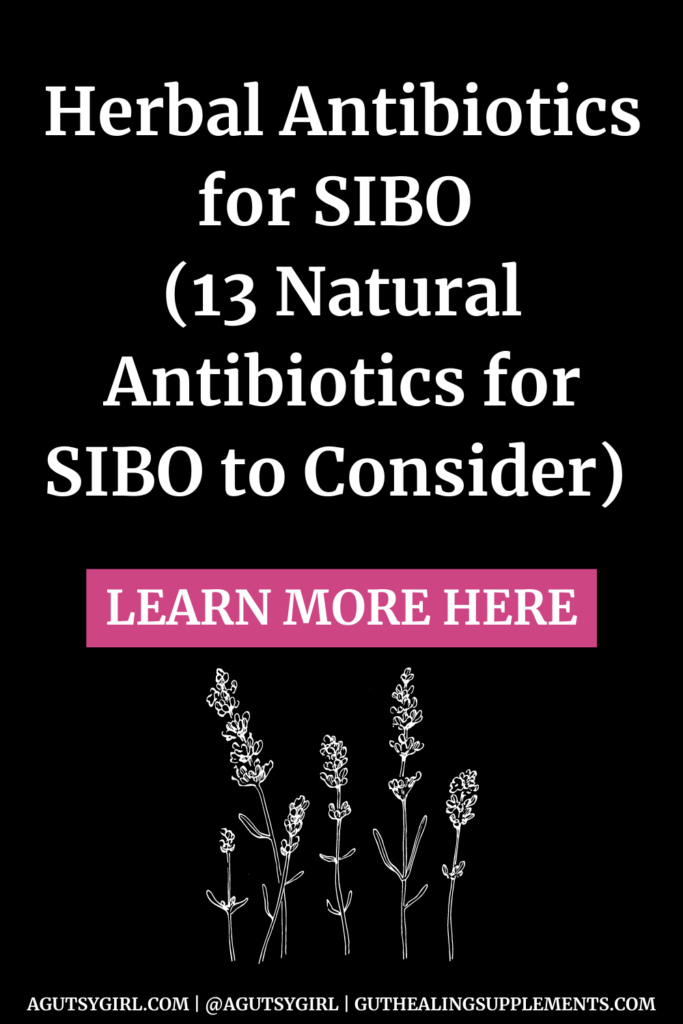
1. Allimax
Allimax is a natural antibiotic. Research has found it to be beneficial against multiple forms of antibiotic resistant bacteria, include E. Coli, staph infections and UTIs.
I talked about this one in Garlic and SIBO because Allicin is a compound obtained from garlic, which is found in Allimax.
According to Allimax, Allicin works because it, “is able to react with micro-organisms and penetrate their cell walls.”
At low concentrations of allicin, the degree of interference may not be lethal, but sufficient to block the microbe’s virulence. At slightly higher concentrations, the effect can prove lethal for the micro-organism.”
This one tends to be very confusing for those following a low-FODMAP SIBO diet since garlic is a high-FODMAP food. However, while eating garlic seems to be the culprit of activating SIBO symptoms, using the antibacterial allicin which has been extracted from garlic is the only way to reap its benefits.
You can buy it HERE.
2. Berberine
Berberine, typically used in conjunction with Allimax and Neem, helps support a healthy balance of microbes in the GI and respiratory tracts, and consists of a compound found in Oregon grape, barberry, goldenseal, and other herbs.
Dr. Amy Myers says,
Berberine is an alkaloid, which means it contains one nitrogen atom. The nitrogen atom allows it to neutralize hydrogen, a common gas caused by SIBO.
According to the NIH,
Berberine is a natural component of many popular medicine plants that ameliorates intestinal inflammation in humans through its modification of the gut microbiota. Potential effect of berberine to the gut may provide therapeutic target for SIBO.
You can purchase Berberine HERE.
3. Neem
Neem comes from the tropical evergreen Neem Tree, which has helped with health conditions from diabetes to heart disease.
As it relates to an antibiotic therapy for SIBO, FoodMarble states,
Neem seed oil contains polyphenols that can act as prebiotics, enhancing the growth of specific ‘good bacteria’ species. These gut microbiota can then increase the production of bioactive phenolic acids derived from the ingested polyphenols which benefit overall health. It also has antibacterial and antifungal properties. Neem extract can kill many types of ‘bad’ microbes, including gram-positive Staph aureus and gram-negative E. coli.
Neem is typically used in conjunction with Allimax and Berberine and helps boost the immune system.
And by the way, remember, when healing the gut, the immune system is what it all comes back to.
You can purchase Neem HERE.

When you use code GUTSYG at checkout, you’ll save an automatic 15% off the FoodMarble device.
4. Oregano
If you go to any SIBO forum, you will see everyone talking about Oregano: You must take Oregano.
The main reasons for this include:
- It is a potent herb with anti-microbial, anti-inflammatory, and antioxidant properties
- Oregano oil works to kill bad bacteria and yeast in the gut microbiome so we use it to treat dysbiosis (bacterial imbalance), Candida overgrowth, Small Intestine Bacterial Overgrowth (SIBO) and Small Intestine Fungal Overgrowth (SIFO).
Please know that this does not (necessarily) mean running out, buying an Oregano essential oil and ingesting it. Do your research.
There is the A.D.P. Oregano and oil of Oregano. I’ve heard of both being use (effectively and non-effectively).
Oregano is a natural, powerful antibiotic, which is why many will choose to use it.
Sources: HERE
5. Dysbiocide
Dysbiocide was a game-changer for me personally.
It supplies a proprietary blend of herbs and herbal extracts to support normal gut health and foster a healthy microbial balance within the gut by eradicating non-commensal flora.
As I mentioned, I have used (use often) Dysbioicide as a stay-away-forever SIBO maintenance herb.
I even put it on my supplement minimalist list and you can find my entire post around dissecting Dysbiocide HERE.
I do not take it with FC Cidal, but if you’re using this as part of your treatment plan in place of an antibiotic, they do recommend the combination.
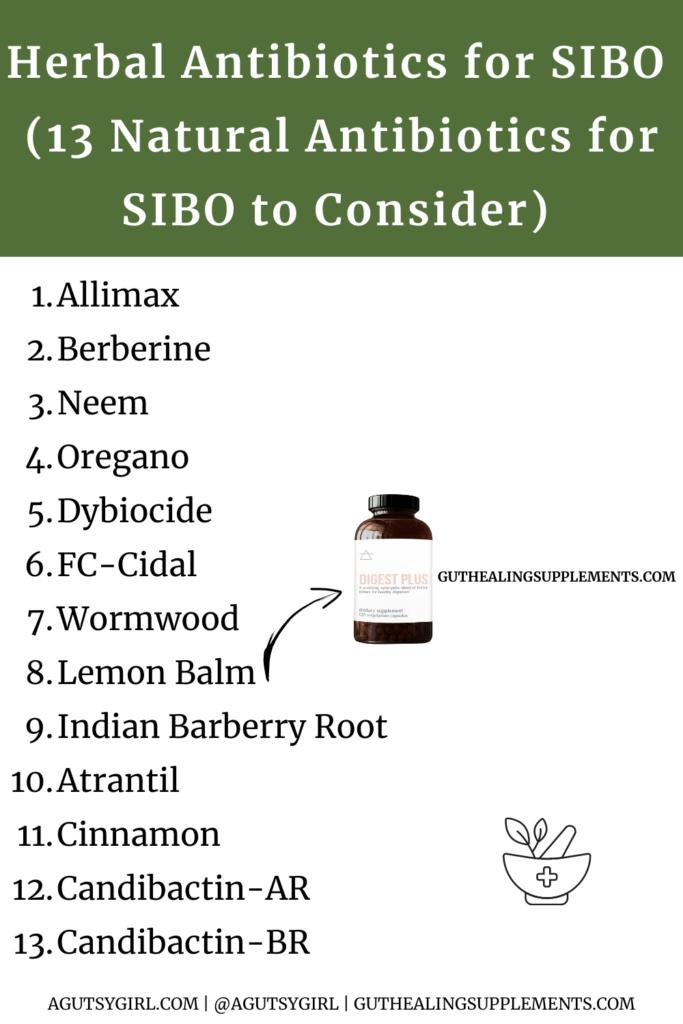
6. FC Cidal
FC-Cidal™, made by Biotics Research, supplies a proprietary blend of herbs and herbal extracts which function to support healthy GI function. This formulation is specifically designed to help support a healthy microbial balance due to a wide array of terpenoid and polyphenolic compounds.
These herbal supplements contain a blend of (7 herbs) botanical extracts that help restore microbial balance.
Using the FC Cidal + Dysbioicide is a protocol used by the multi-center team in a 2014 study: 2 capsules, twice per day (total of 4 capsules per day) for 4 weeks.
Get FC-Cidal HERE.
7. Wormwood
Artemisia absinthium, referred to as Wormwood, possesses several medicinal compounds, which include anti-inflammatory, antimicrobial, and antioxidant properties.
According to Dr. Josh Axe,
Studies show that herbal remedies like wormwood tea or capsules are as good or even better at fighting small intestinal bacterial overgrowth or SIBO symptoms.
He also states,
Additionally, the herbal therapy with wormwood appears to be just as effective as triple antibiotic therapy for individuals who don’t respond to rifaximin.
Apart from being used as the primary ingredient in absinthe, wormwood has been traditionally used to increase appetite, treat digestive disorders, cure fever, and much more.
Get wormwood HERE.
8. Lemon Balm
If you remember from long ago, I was drinking Lemon Balm via tea as part of my healing protocol. I need to stock up on this one again because it’s just a great way to keep stress and SIBO at bay.
Lemon Balm has been shown to cut down some of the bacterial overgrowths that trigger SIBO.
In a study referenced by the NIH, it was stated:
Most of the oils exhibited antibacterial activity in all three assays, however peppermint, lemon balm and coriander seed oils were most potent.
And, in fact, Digest Plus contains 200mg of Lemon Balm in the formulation to help increase the overall success rate of this gold standard product for IBS and SIBO.
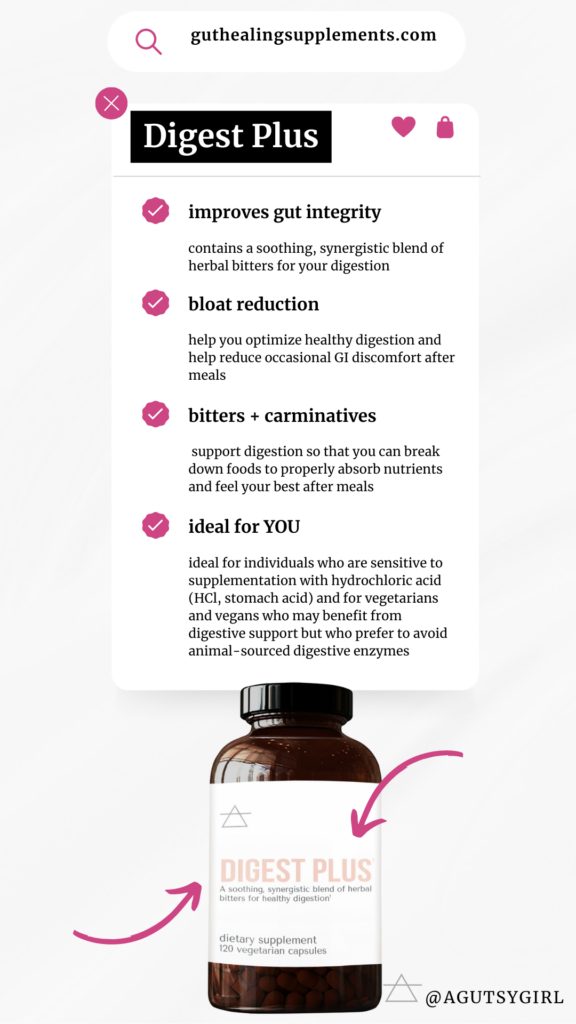
Digest Plus was created specifically for the Gutsy community. It contains: gentian, dandelion, lemon balm, fennel, and ginger for optimal digestion.
You can use code BLOG at checkout to save 15% off Digest Plus or anything else found on guthealingsupplements.com
Lemon Balm also has implications for the nervous system which plays 100% into the healing of SIBO.
9. Indian Barberry Root
Barberry is a large bush that can grow up to 15 feet tall. Though native to Europe, it grows in parts of the US and now grows in Iran. It has leaves similar to a holly bush and red berries. The bark of the trunk and root is known for its medicinal uses as it contains alkaloids that assist in a number of bodily functions, especially of the digestive track.
(Note: Barberry and goldenseal – above for the Berberine – are often used for similar medicinal purposes because both herbs contain the chemical berberine. Berberine shows the ability to inhibit the growth of bacteria in test tubes, and may help the immune system function better. The aqueous extract of barberry has beneficial effects on both the cardiovascular and neural system.)
10. Atrantil
According to Atrantil, “It is formulated by a board certified gastroenterologist to naturally and safely disrupt the the methane production by removing the unwanted bacteria from the small bowel and send them to the colon, where they belong.”
I took Atrantil on and off, sometimes in conjunction with antibiotics. I found it really worked and then it didn’t if you read my final 28-day journal.
That said, maybe it did work because I stayed on it, in misery, for most of the 28 days, then went off. However, I also haven’t relapsed since. Read all about Atrantil HERE.
Get Atrantil HERE. You can also use code AGUTSYGIRL at checkout to save an automatic 10%.
11. Cinnamon
Cinnamon reduces inflammation, helps to regulate our immune system, and reduces bacterial overgrowth.
Dr. Siebecker has been known to use a combination of Allicin, Oregano, Berberine, Neem, and Cinnamon in treating SIBO.
Get a high-quality cinnamon extract HERE.
12. Candibactin-AR
CandiBactin-AR (taken in conjunction with Candibactin-BR below) is a blend of concentrated essential oils and herbal extracts from the aromatic mint family.
According to the Center for SIBO Testing,
The most researched products for treatment of SIBO is Candibactin-AR® and Candibactin-BR® from Metagenics. In a clinical study, combined use of Candibactin-AR® and Candibactin-BR® was as effective as rifaximin in treating SIBO when administered daily over four weeks. Both Candibactin-AR® and Candibactin-BR® are taken in combination for one month.
The formula’s purpose is to support intestinal microbial balance and healthy digestion.
Get Candibactin AR HERE.
13. Candibactin-BR
CandiBactin-BR’s (taken in conjunction with Candibactin-AR above) purpose is to support a healthy microbial balance and the removal of unwanted compounds from the body.
Get Candibactin-BR HERE.
Are There More Natural SIBO Antibiotics?
Are these 13 herbal antibiotics for SIBO all there are?
Not even close. They are probably just the most talked about.
If you want to learn more about these or herbs in general, check out the Online Herb Encyclopedia of Knowledge.
And what is the Protocol?
While I have shared 13 potential herbal antibiotics for SIBO treatment, that doesn’t mean you can just haphazardly take them however.
In order for them to work, you must work with a skilled practitioner.
Any of these could be part of various treatment regimens, but there is a specific way to go about them – timing, dosage, etc. that only a practitioner can provide.
The intention behind writing this for you is so that you have the information and can do your own research to then work on with your practitioner.
It’s also so that when your practitioner says you need xyz product, you have a trusted resource to come back to for purchasing said product(s).
The Underlying Issue
And remember what I said at the beginning of this article…you must also know the root cause for your SIBO and/or irritable bowel syndrome. Without it, and without making the necessary lifestyle adjustments, you’ll simply become a hamster on a wheel trying various antimicrobial herbs without success.
Success requires a foundation. And this is exactly what I teach in Gut Healing for Beginners; finding the root cause to your gut health problems is the most effective way to experiencing lasting freedom from gas, bloating, and diarrhea.
This foundation includes things like:
- Appropriate diagnosis; breath test
- Correct dietary treatment and dietary changes
- Focus on lifestyle
The most common cause of SIBO (root causes) as given by Dr. Nirala Jacobi include:
- Motility; the migrating motor complex
- Overall digestion; including low stomach acid (also plays into gut motility)
- Outflow problems
- Medications
You can read about all 4 of these in detail HERE.
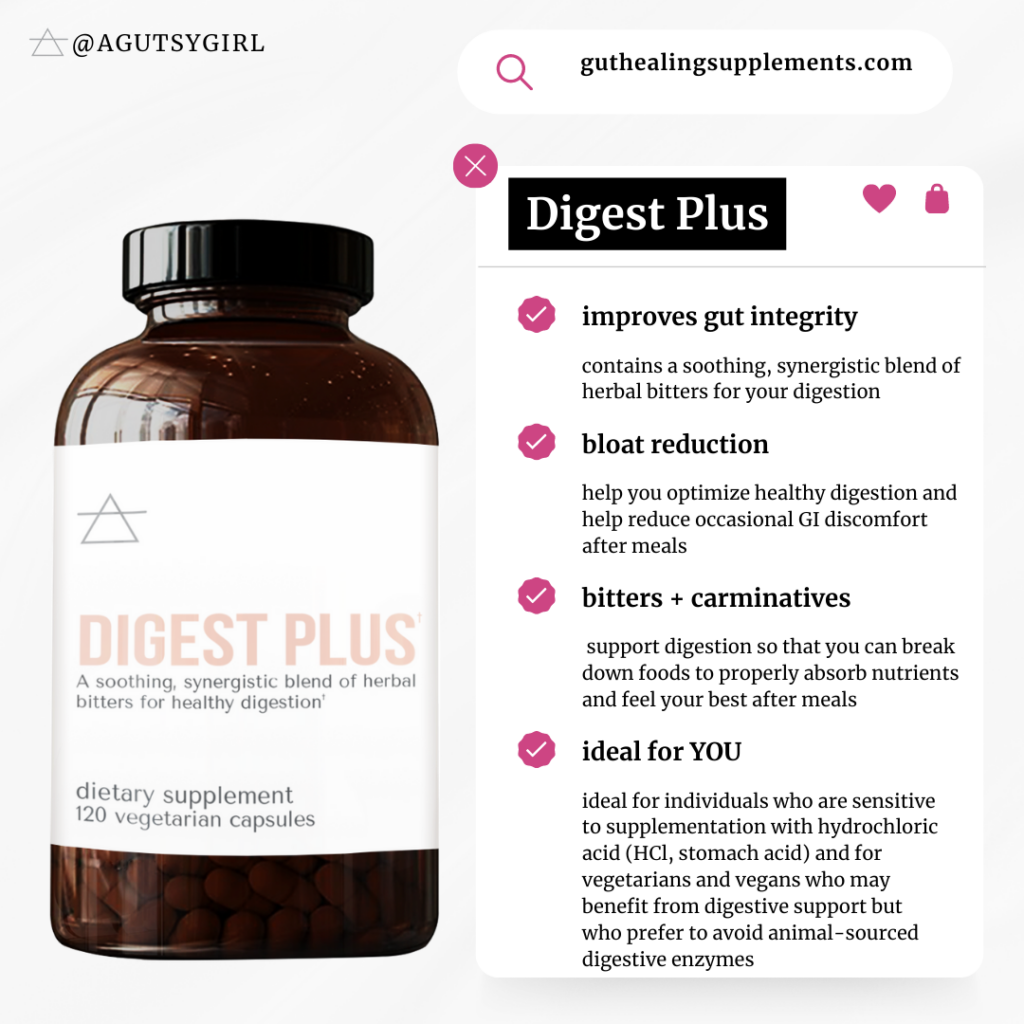

Herbal Antimicrobials Wrap Up
While herbal antimicrobials can be a good idea please remember, if any (or all!) of these have not worked for you or are not working, and you need a SIBO antibiotic(s), it’s okay.
Do not stress about it. Just do what you need to do and move forward.
If you liked this post on herbal antibiotics for SIBO, you might also enjoy:
Xox,
SKH
🤰 bloating be gone! weight loss through optimal gut health for women
💃ʜᴇᴀʟ ʏᴏᴜʀ ɢᴜᴛ. ʜᴇᴀʟ ʏᴏᴜʀ ʟɪfe.
🫶🏻 founder gutbyome.com

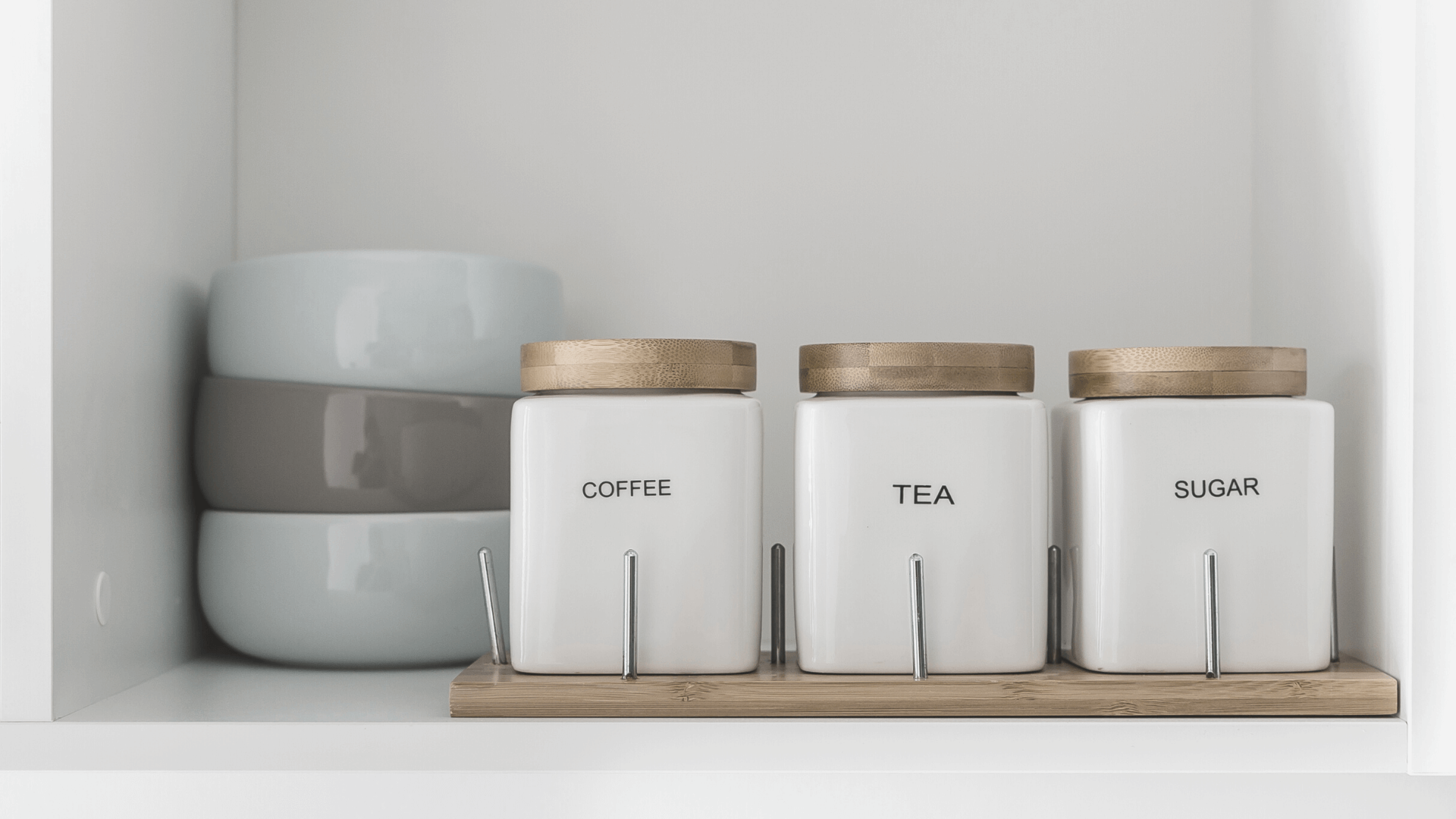

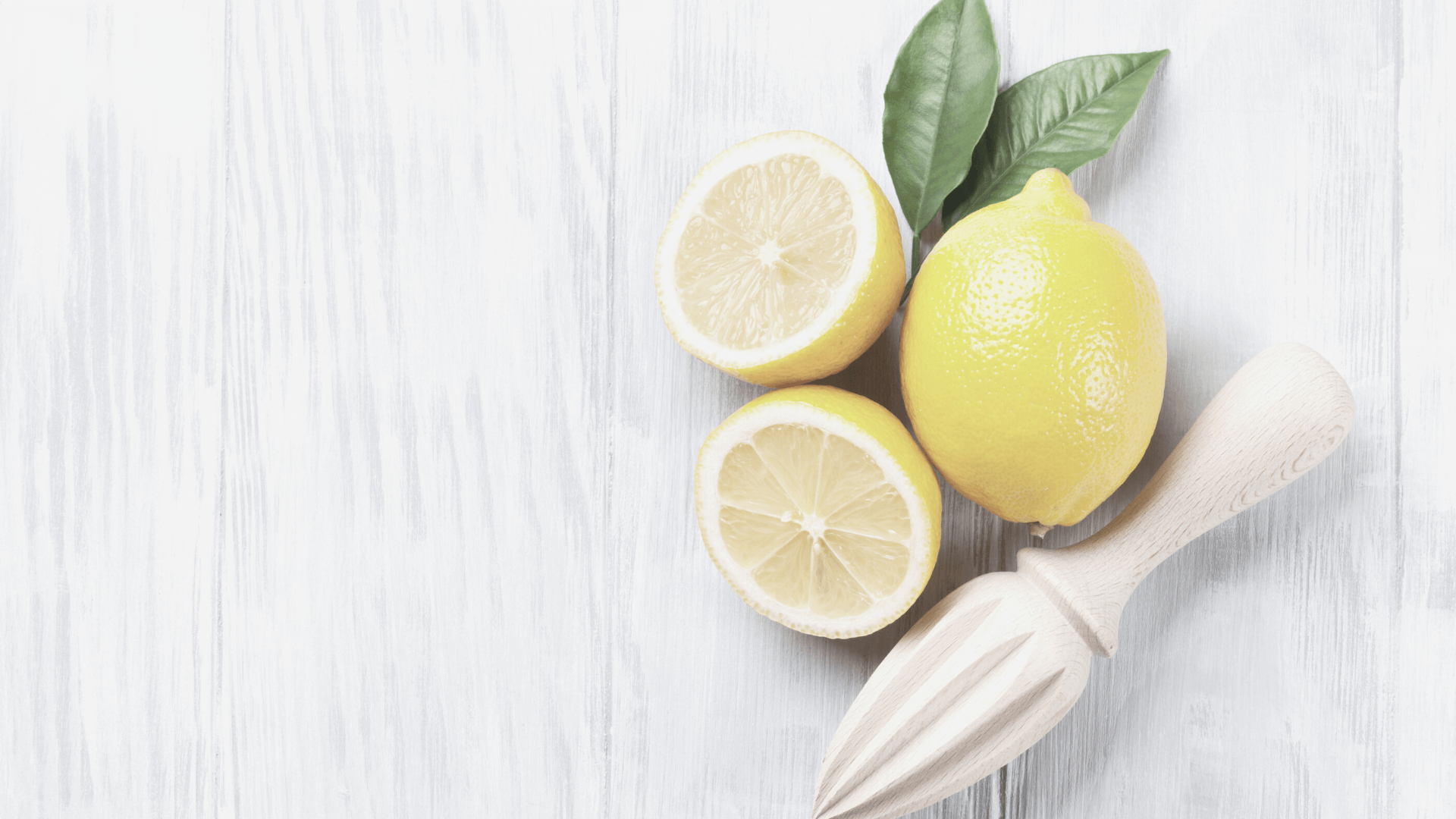
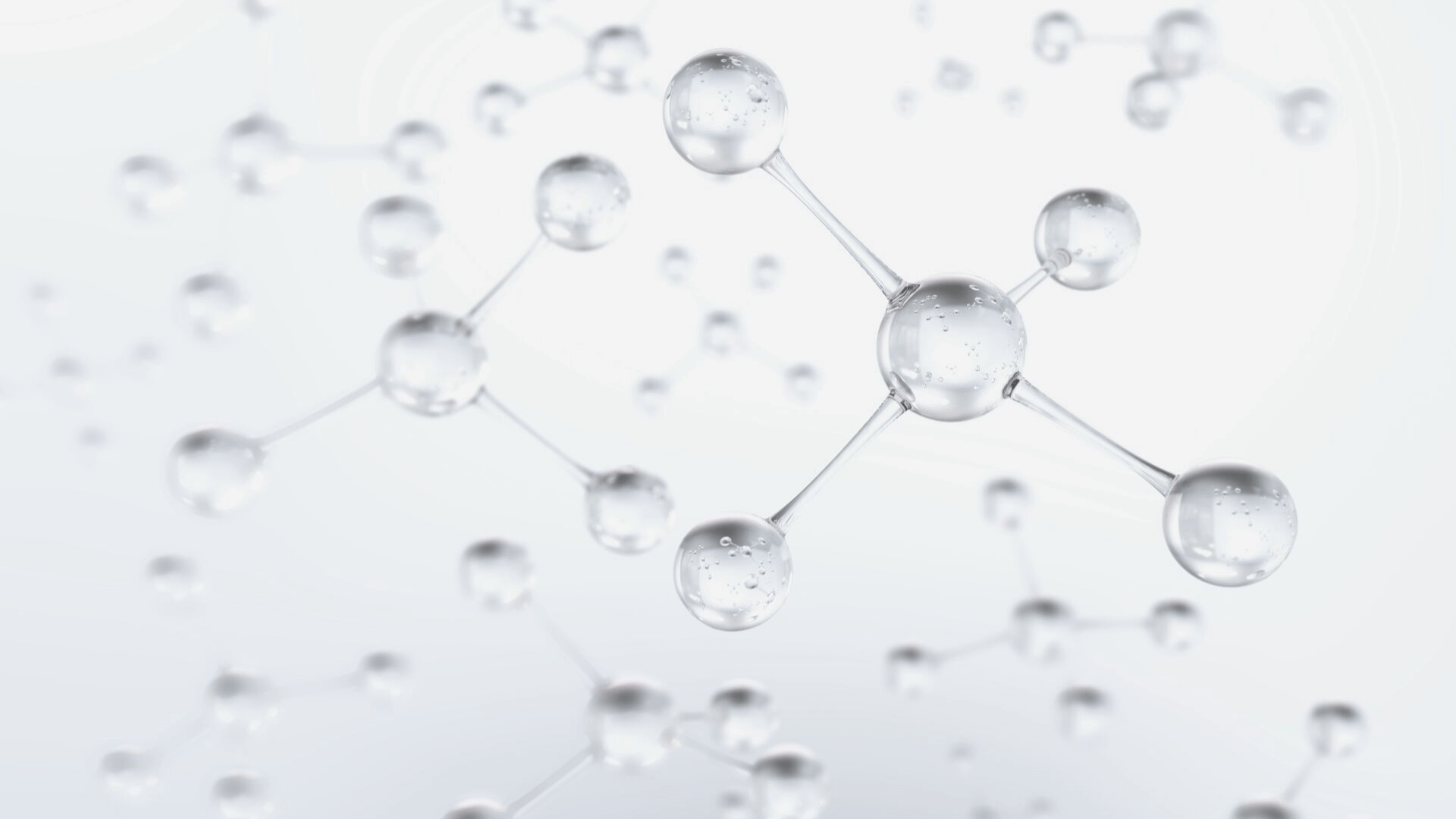

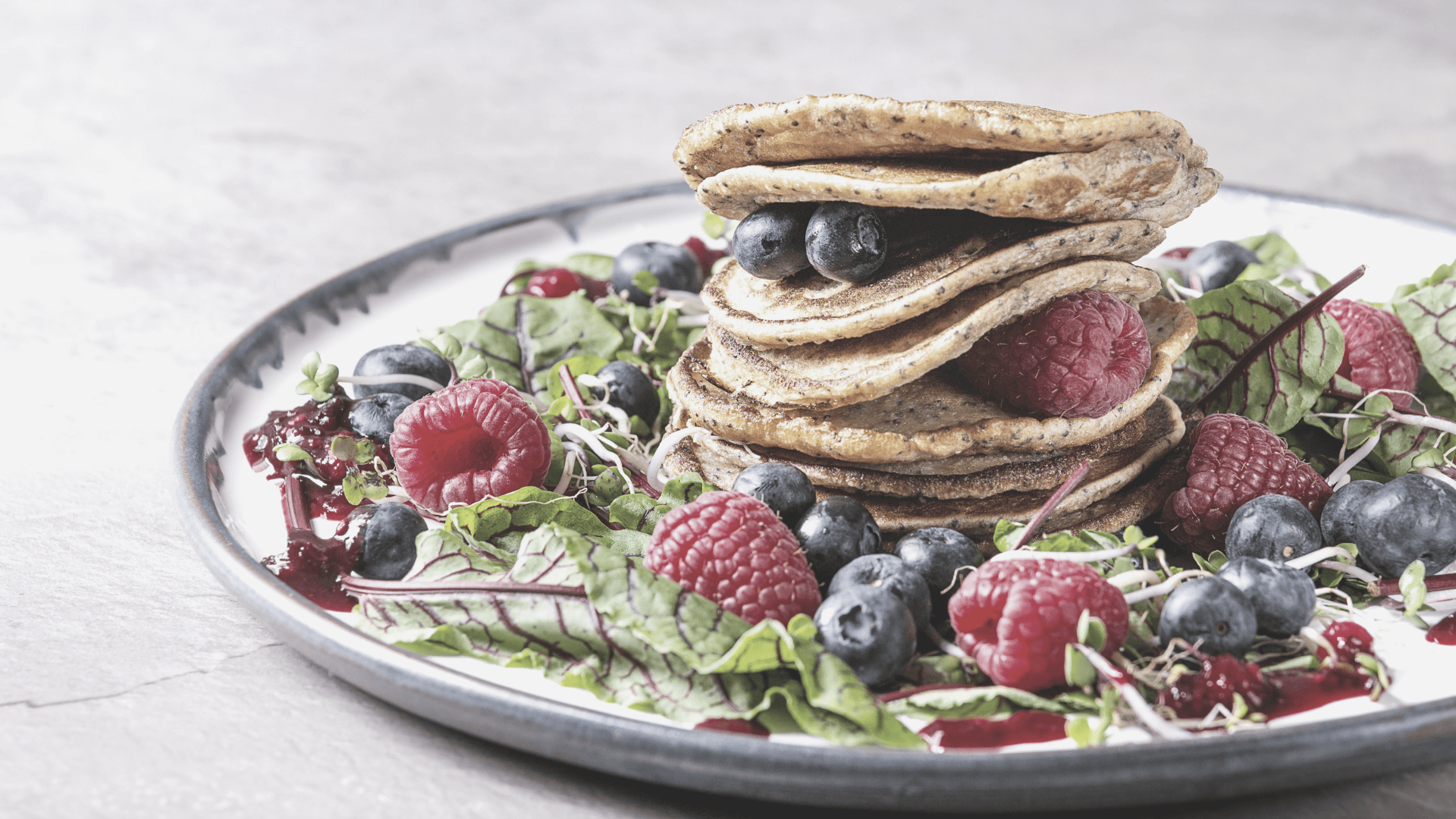
Thank you for this great article. So well organized and articulated. I do have a question regarding antibiotics. I recently was told I had a sinus infection and needed to take an antibiotic. Prior to that I’ve been treating my SIBO and H Pylori with a product called Gastromend which is DGL and Mastic Gum and having lots of relief.l This week i was diagnosed with a sinus infection and am on day 3 of an antibiotic. What would be a good support to take in between doses of the antibiotic. I know you are not a doctor but I appreciate your thoughts. Thank you, cindy
Hi Cindy – Thanks for reaching out and stopping by. I just think anything to help boost your immune system and support any healthy bacteria. Just give it time, and know that your gut bacteria can change in as little as three days so you’ll be fine with consistency.
Hi.
You mentioned underlying causes to be treated to prevent sibo from returning. But what can underlying causes of Sibo be? I thought it WAS the underlying cause. Thanks in advance!
Apparently my underlying cause to SIBO was low stomach acid.
Very typical.
Thanks for sharing such great information I liked natural things @!!
Hi Cindy. I have taken the Rifaximin and Neomycin. It left me not able to eat at night. Better. But my doctor doesn’t seem to want to figure out what is the cause of my methane SIBO. Where should I go in Montana, and what should I ask them to do?
Thank you for all this info! I think my situation is different from most. I was diagnosed with methane dominant SIBO last year. But I don’t have bloat, I have the opposite problem. I have chronic D, for 6 years now. Low FODMAP and atrantil helped in the beginning. But, FC Cidal & Dysbiocide made everything go completely off the tracks. Now everything I eat is poison. What are your thoughts?